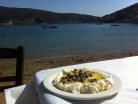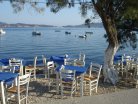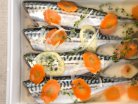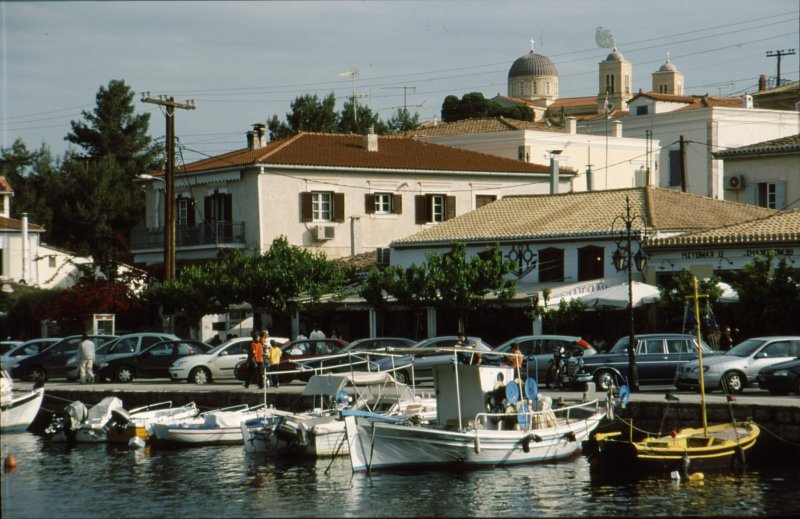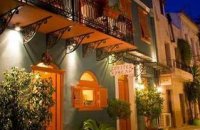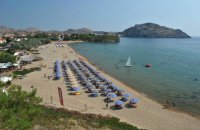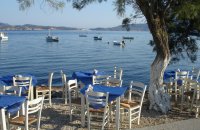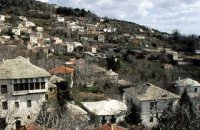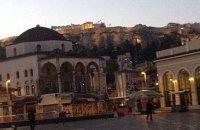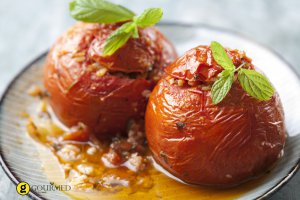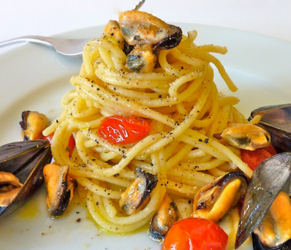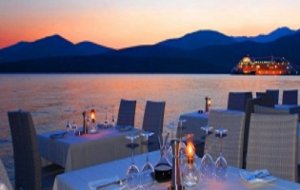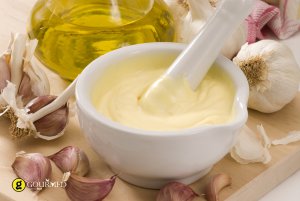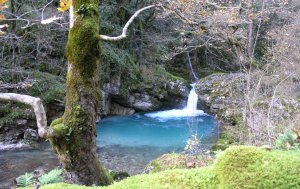Philosophers and the birth of democracy? The Acropolis and the Parthenon? The picturesque, white-washed houses and blue roofs of the Cyclades? Aristotle Onassis and Jackie O? Greek gods? Plates crashing on the floor? Never on Sunday? Or most recently, perhaps, Meryl Streep and Mama Mia?
You’re right about all of the above. Greece is this and so much more. In fact, I’ve been half a dozen times and on one occasion even stayed for an extra two whole months, yet never tired of those Wedgewood blue skies, the crystal clear turquoise waters of the Aegean and the terminally happy, outgoing warmth of the people.
We chartered a 39-foot yacht this August with another couple, and after a day in Athens (where you must stay at the ideally located, small and friendly Acropolis View Hotel), the four of us made the 3 hour journey north to Skiathos island, picked up the boat and sailed around a cluster of islands called the Sporades (English translation: scattered or sporadic).
While, out of Greece's 1400 islands, the well-known and justifiably popular Santorini, Crete, Rhodes, Hydra and Mykonos get most of the coverage, the Sporades, unknown to me until last month, are far less discovered and offer a charm all of their own.
You don’t need to buy or rent your own sailboat (as you can easily hop on and off the frequent ferries plying these waters) to visit them all. But I must admit that it’s quite a different experience to have your own personal hotel and transport ready when you are and lovely to find cozy, cloistered, coves (over 1350 to pick from) to tuck into when the mood strikes.
The Sporades are, reading from left to right or west to east, Skiathos, Skopelos, Allonnisos and Skiros, with a handful of uninhabited islands reserved for marine sanctuaries further east and north. (We were curious to observe these denizens of the deep and ventured forth, only to discover a couple of dolphins and then, on a nearby isle, half a dozen scraggly goats. Overly anxious and determined to spot some exotic aquatic creature, we enthusiastically mistook an oddly shaped floating log for a seal.)
Helming the boat, working the sails, anchoring and performing other boat chores almost continually, builds an appetite. Aside from breakfast (big bowls of thick and creamy Greek yogurt topped with nuts, fresh fruit and local honey), we would head into port for lunch and dinner, anchor and find a table at one of the many cheery water-front tavernas dotting the islands. Prior to dining, it’s the local habit to have an ouzo, their national aperitif, a clear, aniseed-flavored liquor. It’s rather intense on its own, and so is served along with a little pitcher of water and a glass of ice cubes.
Invariably we ordered much the same day or night (always shared everything Hong Kong style), yet were never bored with the fresh and abundant fare. Plates of big, fat, white anchovies, fresh tomato, cucumber and red pepper, salad topped with a huge slab of feta cheese, taramosalata (a kind of cod roe dip), bowls of marvelous kalamata olives, crispy spanakopita (a yummy phyllo pastry spinach pie), fried, sautéed, or grilled squid and the ubiquitous octopus also available in various incarnations (sliced cold, topped with dill and marinated in lemon juice and vinegar, my favourite), the Japanese sounding but very Greek specialty of saganaki (one of three or four local cheeses folded over, fried in olive oil and served with lemon wedges) and souvlakia (can be chicken, pork, lamb or beef threaded on a skewer along with onion, pepper, mushrooms and tomatoes) served with rice. A bread basket accompanied every repast and was usually refilled once or twice due to major sopping up of sauce and juices and double and triple dipping into the taramosalata.
No longer the once happy mecca of “Greece on $10 a Day,” these simple meals are now about US$18 per person.
As for the juice of the grape, while wine was a given at noon or night, no time was to be wasted thumbing through pages of wine lists. You are asked if you want white, red or rose (or maybe all three!) and it’s quickly brought to the table in a large carafe, invariably holding more than the contents of a normal bottle. There are some excellent Greek wines aside from the cheap and cheerful carafes, but only in the more up-market restaurants are you given a wine list. We consumed copious amounts of the highly drinkable wine and I often asked for my own small bottle of the traditional and uniquely Greek, retsina, definitely an acquired taste.
About thirty years ago, when I first took a mouthful of this strongly flavoured brew, redolent of pine tree resin (which has been added during the fermentation process as a preservative ever since antiquity), I immediately spat it out thinking I was the butt of a cruel oenophilic joke. But giving it another chance, it didn’t take long for me to become a big fan. As I was fond of whipping up my own renditions of moussaka for dinner parties (alternate layers of egg plant, sliced potatoes, minced meat flavoured with cinnamon and topped with a thick béchamel sauce) when I returned from my first Greek trip, I managed to locate retsina in one or two shops in a Greek neighbourhood in New York and prepared to inflict the smelly stuff on my guests. As it paired so well with this dish, I assured them this was the true Greek way to dine, and have managed to create quite a large number of retsina drinkers over the years. I recently discovered, to my surprise, that over 15 million bottles are exported annually; evidently I was not the only one to successfully convert my friends.
The Greeks love their sweets and the assortment of baklava-type concoctions and cakes on offer are many and varied. Most consist of honey, nuts, phyllo pastry, perhaps some powdered sugar and more honey; but whichever you choose, they are all sticky, sweet and delicious.
The local wines and ouzo cost just a few euros in Greece, but many times that back home. Likewise for the marvellous range of local honey, often sold in jars half-filled with pistachios and other nuts; they also offer all sorts of delectable jams and chutneys with figs and prunes. So stock up. Wrap the bottles and jars in sweaters in your check-in luggage, and walk through nothing to declare. Above all, don’t forget to invite me to your dinner party when you show your photographs of your holiday in Greece; if you make the moussaka, I’ll bring the retsina.






